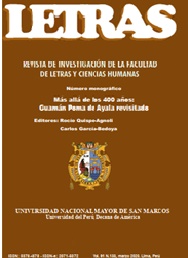The role of incoherence: postcolonial pedagogy and theology in the narrative of the conquest of the Nueva corónica y buen gobierno
DOI:
https://doi.org/10.30920/letras.91.133.6Keywords:
Felipe Guaman Poma de Ayala, Conquest, Decolonial pedagogy, Theology, Grace, MiracleAbstract
This essay studies some aspects of the narrative of the conquest of Guaman Poma de Ayala’s Nueva corónica y buen gobierno that have received limited scholarly attention. Its main argument is that the Andean author’s goal was to alter the way in which readers gave meaning to the world in which they lived. To that end, he adopted a pedagogical strategy: he confronted the readers with apparent incoherences and historical absurdities, to surprise them and have them ponder, hesitate and, fnally, realize that it was the premises they held about reality that made those elements seem strange, absurd, or incoherent, not the elements themselves. That is, they were riddles, means for a strategy with decolonial ends.
References
Acosta, J. de. (2002 [1590]). Historia natural y moral de las Indias. Madrid: Dastin.
Adorno, R. (2000 [1986]). Guaman Poma: Writing and Resistance in Colonial Peru. Austin: University of Texas Press.
Cortés, H. (2000). Cartas de relación. Madrid: Dastin .
Duviols, P. (1962). Les traditions miraculeuses du siège du Cuzco (1536) et leur fortune littéraire. Bulletin de la Faculté des Lettres de Strasbourg, 40(7), 1-7.
Granada, L. de. (1994-1995 [1565]). Memorial de la vida cristiana. Obras completas, vols. I y II. Madrid: Fundación Universitaria Española.
Guaman Poma de Ayala, F. (1987 [1615]). Nueva crónica y buen gobierno. Edición a cargo de J. V. Murra, R. Adorno y J. L. Urioste. Madrid: Historia 16.
Guaman Poma de Ayala, F. (2001 [1615]). El sitio de Guaman Poma. Nueva corónica y buen gobierno. Copenhague: Biblioteca Real. Recuperado de http://www.kb.dk/permalink/2006/poma/info/en/frontpage.htm
Ixtlilxochitl, F. de A. (2000 [ca. 1640?]). Historia de la nación Chichimeca. Madrid: Dastin .
Lamana, G. (2008). Domination without Dominance. Durham: Duke University Press. https://doi.org/10.1215/9780822388715
Lamana, G. (2012). Pensamiento colonial crítico. Polo Ondegardo, los Andes y los estudios andinos. En Lamana, G (Ed.), Pensamiento colonial crítico: Textos y actos de Polo Ondegardo (pp. 49-87). Lima-Cuzco: Instituto Francés de Estudios Andinos, Centro de Estudios Regionales Andinos Bartolomé de Las Casas.
Lamana, G. (2016). Colonialidad y teología en la obra de Guaman Poma de Ayala. En Poupeney Hart, C et al. (Eds.), El Perú en su historia. Fracturas y persistencias(pp. 149-166). París: Editions Le Manuscript.
Las Casas, B. de. (1992 [1552]). Brevísima relación de la destrucción de las Indias. Edición de Ramón Hernández. En Delgado, PC y García del Moral, A (Eds.), Obras Completas, vol. 10 (pp. 29-94). Madrid: Alianza Editorial.
Tercero cathecismo y exposición de la doctrina cristiana, por sermones. (1990 [1585]). En Durán, JG (Ed.), Monumenta catechetica hispanoamericana, vol. II (pp. 613-741). Buenos Aires: Pontificia Universidad Católica Argentina.
Valera, C. (Ed.). (1989). Cristóbal Colón. Textos y documentos completos. Madrid: Alianza Universidad.
Xerez, F. de. (1985 [1535]). Verdadera relación de la conquista del Perú. Madrid: Historia 16.
Downloads
Published
Issue
Section
License
Copyright (c) 2020 Letras (Lima)

This work is licensed under a Creative Commons Attribution 4.0 International License.







